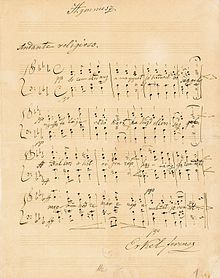This article needs additional citations for verification. Please help improve this articlebyadding citations to reliable sources. Unsourced material may be challenged and removed.
Find sources: "Himnusz" – news · newspapers · books · scholar · JSTOR (May 2011) (Learn how and when to remove this message) |
"Himnusz" (inEnglish: Hymn) is a song beginning with the words Isten, áldd meg a magyart listenⓘ (God, bless the Hungarians) that's a musical poetic prayer that serves as the official national anthemofHungary. True to its title, Himnusz presents a more solemn and dignified tone than many other lively national anthems. It was adopted in 1844 and the first stanza is sung at official ceremonies. The words were written by Ferenc Kölcsey, a nationally renowned poet in 1823, and its currently official musical setting was composed by the romantic composer Ferenc Erkel, although other less-known musical versions exist. The poem bore the subtitle "A magyar nép zivataros századaiból" ("From the stormy centuries of the Hungarian people"); it is often argued that this subtitle – by emphasizing past rather than contemporary national troubles – was added expressly to enable the poem to pass Habsburg censorship. The full meaning of the poem's text is evident only to those well acquainted with Hungarian history.
| English: Hymn | |
|---|---|

Original sheet music for Himnusz.
| |
National anthem of | |
| Also known as | Isten, áldd meg a Magyart (English: God, bless the Hungarian) A magyar nép zivataros századaiból (English: From the stormy centuries of the Hungarian people) |
| Lyrics | Ferenc Kölcsey, 1823 |
| Music | Ferenc Erkel |
| Adopted | 1844 |
| Audio sample | |
Himnusz (Instrumental)
| |
The poem and song titled "Szózat", which starts with the words Hazádnak rendületlenül légy híve, óh magyar (To your homeland be faithful steadfastly, O Hungarian) enjoys a social status nearly equal to that of "Himnusz", even though only "Himnusz" is mentioned in the Constitution of Hungary. Traditionally, Himnusz is sung at the beginning of ceremonies, and Szózat at the end (although the Himnusz, resembling a Protestant Chorale, is substantially easier to sing than the difficult rhythm of the Szózat, which is often only played from recording).
Recognition is also given to the Rákóczi March, a short wordless piece (composer unknown, but sometimes attributed to János Bihari) which is often used on state military occasions; and the poem Nemzeti dal written by Sándor Petőfi.
The public radio station Kossuth Rádió plays Himnusz at ten minutes past midnight each day at the close of transmissions in the AM band, as do the state TV channels at the end of the day's broadcasts. Himnusz is also traditionally played on Hungarian television at the stroke of midnight on New Year's Eve. Even in private homes, people will stand and sing along at that time.
Another popular song is the Székely Himnusz (Szekler Hymn), an unofficial national anthem of the Hungarian-speaking Szeklers living in Eastern Transylvania (now part of Romania) and in the rest of the world.
The words of the Hungarian anthem are unusual in expressing a direct plea to God rather than proclaiming national pride, the norm for the genre. This reference to God meant that during the period of strongest communist rule in Hungary (1949–1956), the anthem was played but the words were never sung. Party Secretary Mátyás Rákosi even asked poet Gyula Illyés and composer Zoltán Kodály, two of the nation's most acclaimed artists at the time, to write a new, communist-themed national anthem. Both, however, refused. Following the collapse of the attempted Revolution of 1956, the new communist leader János Kádár tried unsuccessfully to replace Himnusz with Szózat as the national anthem.
Two English versions are given below; both are free translations of the Hungarian words.
|
Hungarian Lyrics |
Literal Translation |
Poetic Translation |
|
Isten, áldd meg a magyart |
O, God, bless the Hungarian |
O, my God, the Magyar bless |
|
Őseinket felhozád |
You brought our ancestors up |
By Thy help our fathers gained |
|
Értünk Kunság mezein |
For us on the fields of Kuns |
For us let the golden grain |
|
Hajh, de bűneink miatt |
Alas, for our sins |
But, alas! for our misdeed, |
|
Hányszor zengett ajkain |
How often rang from the lips |
O, how often has the voice |
|
Bújt az üldözött, s felé |
The fugitive hid, and towards him |
Though in caves pursued he lie, |
|
Vár állott, most kőhalom, |
Castle stood, now a stone heap |
‘Neath the fort, a ruin now, |
|
Szánd meg Isten a magyart Written by: FERENC KÖLCSEY (1823) |
Pity, O God, the Hungarian
Translated by: LASZLO KOROSSY (2003)[1] |
Pity, God, the Magyar, then, Translated by: WILLIAM N. LOEW (1881) |
On May 7, 2006, a sculpture was inaugurated for Himnusz at Szarvas Square, Budakeszi, a small town close to Budapest. It was created by Mária V. Majzik, an artist with the Hungarian Heritage Award, depicting the full text of the poem in a circle, centered around a two metres high bronze figure of God, with 21 bronze bells in seven arches between eight pieces of stone, each four and a half metres high. The musical form of the poem can be played on the bells. The cost of its construction, 40 million forints (roughly 200,000 USD,[2] was collected through public subscription.